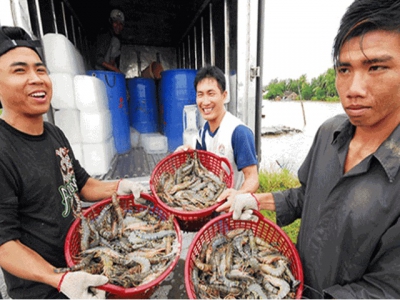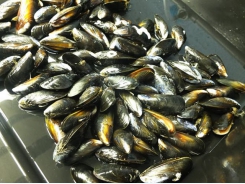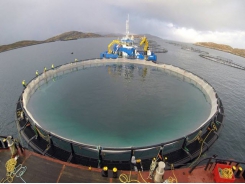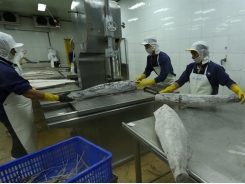Nam Định: Organic black tiger shrimp farming

Nguyễn Văn Phúc in Hải Triều commune (Hải Hậu province)owns nearly three hectares of white leg shrimps farming areas and black tiger shrimps mainly. Average production reaches 15 – 17 tons/ha, helping him earn 400-500 million VND per year.
Phúc says that he usually went fishing with his father but they suffered difficult life due to harsh weather. He then started a new life onshore with investment into white leg shrimp and black tiger shrimp farming in 2000. He applied advanced technology into his farming system in 2006 with one aerator per one hectare, plastic lined ponds and underground air release system.
To avoid risks from diseases, Phúc uses BiOWiSH for nutrition utilization, speeds up growth rate, increase survival rate, reduce feed costs by 10% and eliminate disease infection rate especially intestinal diseases. Post larva is provided by Vietnam-Australia Group and some suppliers in Nha Trang of Khánh Hoà. With two harvests per year, ponds are cleaned and cleared before stocking new seeds.
He invests averagely 20-25 million VND/ha/year with costs for pond cleaning, plastic lining and water treatments included. Shrimps are harvested after six or seven months. According to his experience, water resources and environment are the most important factors for organic shrimp farming, with pure sea water and fishes keeping ecosystem balanced. After a few days disposal substances go down to the bottom of the ponds, he pours salt water into each pond and has post larvae stocked. Plastic is lined from the surface to the bottom of the ponds, not any chemical substance is used. Farmers in Hải Hậu and Nam Định are developing this practice to reduce costs, diseases and antibiotics.
Có thể bạn quan tâm
Phần mềm

Phối trộn thức ăn chăn nuôi

Pha dung dịch thủy canh

Định mức cho tôm ăn

Phối trộn phân bón NPK

Xác định tỷ lệ tôm sống

Chuyển đổi đơn vị phân bón

Xác định công suất sục khí

Chuyển đổi đơn vị tôm

Tính diện tích nhà kính

Tính thể tích ao hồ



 Shrimp by-products hold ‘gold mine’ potential for Vietnamese…
Shrimp by-products hold ‘gold mine’ potential for Vietnamese…  Roundtable shows aquaculture industry way forward
Roundtable shows aquaculture industry way forward